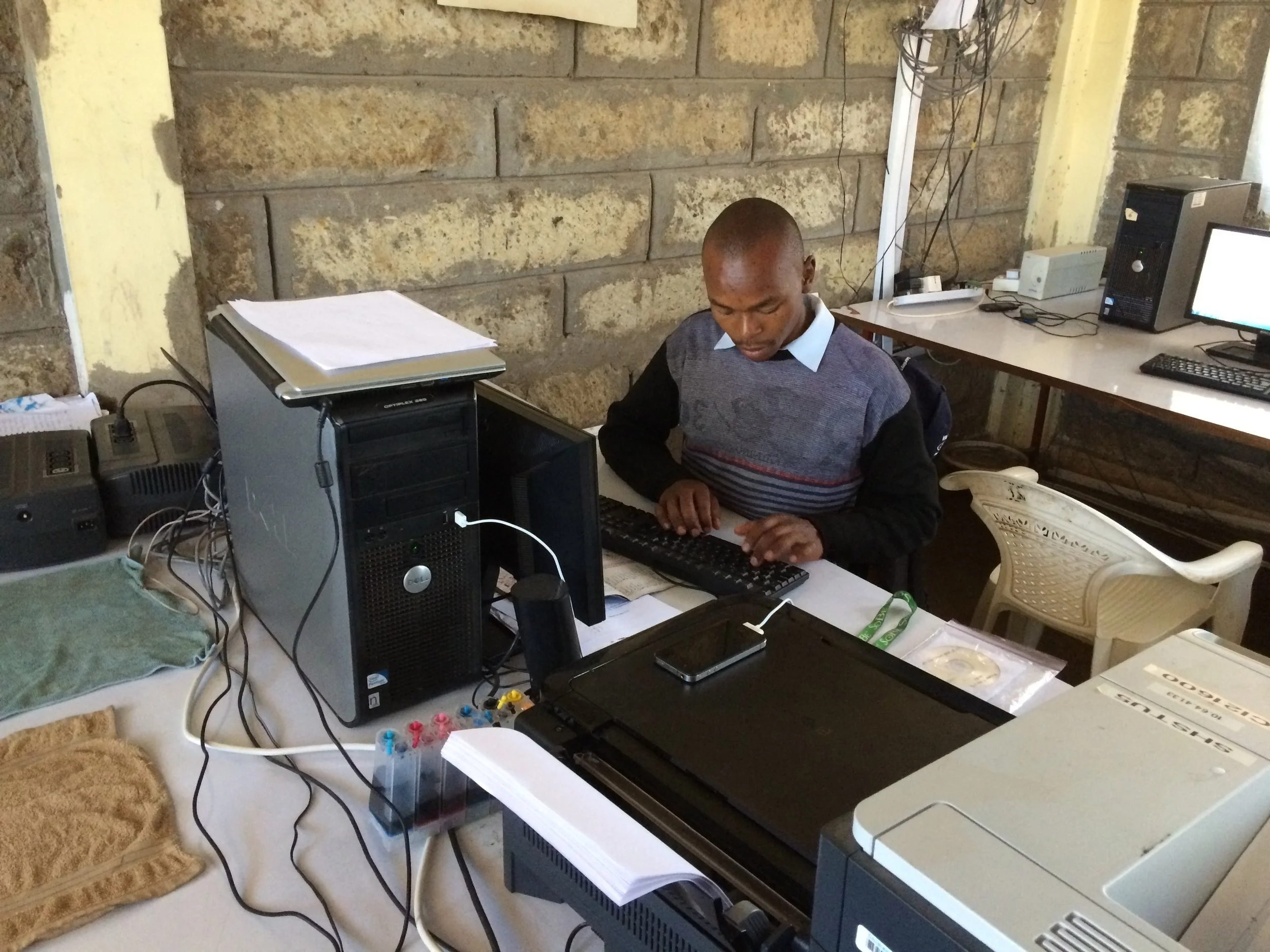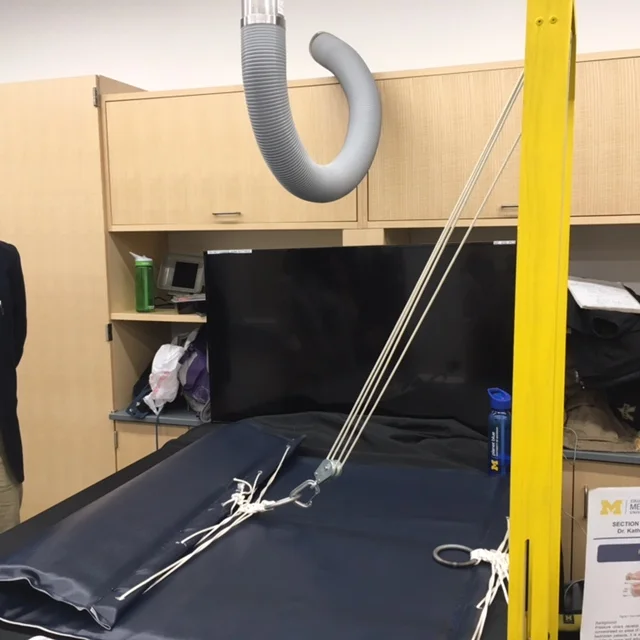
Technology in Kithoka
MichiKen continues the expansion of technology resources in Kithoka. The 20 workstation computer lab at Bishop Lawi Imathiu Secondary School (BLISS) is ably maintained by Julius Mwangi, with strategic direction by Jim Sterken, President of MichiKen. Internet connectivity has been expanded to include the Kithoka Polytechnical School. The Kenyan national government now requires many online education reports, so the BLISS computer lab has become a valuable resource for teachers throughout the Meru area. In 2016, technology resources were further expanded with the delivery of 30 tablets to BLISS. In 2019 we were able to upgrade to a 10Mbps fiber optic internet connection. In 2020, we will expand WIFI access further in the growing BLISS campus and beyond, and we will continue to investigate use of online education tools like Khan Academy.

Microloans
We are now in year three of the microloan program, a zero interest loan program for Kithoka area small businesses. Our focus on local management and control has been strengthened with partnerships with the Kanja Women Group and the Scheme Men Self-Help Group, two local organizations which each received 250,000 Kenya shillings (approximately $2,500) for loans to their members. Payback rates remain strong and we are grateful for Bessy Mugambi, our part-time project manager based in Meru.

University and Hospital Collaborations
Two universities, Kenya Methodist University and Meru University, and a regional hospital system, Consolata Hospital, are within 10 miles of Kithoka. There has been much productive collaboration between University of Michigan faculty and local faculty during the past seven years. Dr. Peter Ngedge holds joint appointments at Meru University and Consolata Hospital and has provided critical guidance to our UM students. A new venture by the UM School of Engineering placed four students in Meru for eight weeks to identify and scope projects. Two projects were featured at the UM College of Engineering Design Expo – a mechanical hoist for shifting patients in hospital beds to relieve pressure sores and a crutch designed for uneven terrain.

Over 2,200 Children Receive Preventative Dental Care
The University of Michigan School of Dentistry sends a loyal and active group to Kithoka each year. Seven students and two faculty work throughout each academic year to prepare for the annual trip. Their logistical expertise in management of supplies is impressive. They commandeer a large conference room at Thiiri just to keep it all organized, then proceeded to serve over 2,200 children each trip at schools and clinics in the greater Meru area. They provided the children with vital dental education, supplies, fluoride treatments, and evaluation. When dental issues are identified, patients are referred to local dental clinics for longer term care.

Pharmacy Education and Practice
Pharmacy Education and Practice
Dr. Vicki Ellingrod regularly leads a team of University of Michigan Pharmacy graduate students to partner with faculty and pharmacists at the Kenya Methodist University School of Pharmacy. They exchange ideas about the practice of pharmacy and the structure of pharmacy education. The team also works on the framework for future research focusing on the high rate of chronic pain in Kithoka, as well as non-adherence to antihypertensives. These projects will be implemented during future trips. Additionally, our pharmacy students are the male instructors for the sexual health education classes described above.

Sex Education
The Kithoka community is deeply grateful that Dr. Amy Tremper returns each year to provide sexual health education to teens. Culturally, a parent/child conversation about sex is unlikely, yet the Kenyan parents have asked the schools to teach their children, particularly in the wake of the HIV/AIDS epidemic. So Amy’s practical materials and approach, combined with her sensitivity to Kenyan culture, fills a critical gap. Amy authored a teen-appropriate guide specifically for Kenya which is distributed to each teen. The Kenyan teens submit anonymous questions via index cards, so Amy and her recruited grad student assistants are able to answer pressing questions. The impact of this ongoing project is immeasurable.

Poor Nutrition or Dehydration Linked to Chronic Pain?
Through the community health surveys of prior summer trips, Dr. Daniel Clauw has identified a high level of chronic pain in the Kithoka community. Two-thirds of Kithoka residents report having chronic pain, while worldwide the average reported level is one-third. Hypothesizing that poor nutrition or even dehydration may be a factor, Dan asked a world’s expert on the role of diet in pain, Dr. Kathleen Holton of American University, to join us on this year’s trip. Again working with Dr. Peter Ndege, Dr. Holton worked with the medical and pharmacy students on the trip to complete a large pilot study that suggested that hydration and a low glutamate diet was very helpful in treating pain. These exciting preliminary results are being submitted for publication and are being used to apply for future NIH funding to pursue these studies in the Meru region.

Scholarships
There is poor and then there is very poor. BLISS teachers have reached into their own pockets to pay the modest BLISS annual tuition of $125 for some of the very poor students who demonstrate high potential. Since 2015, MichiKen has funded a yearly BLISS scholarship program for these children, and for needy BLISS graduates who qualify for public universities. Approximately 20% of Kenyan secondary school graduates are granted government scholarships to public universities, based on senior year examinations. Even the relatively small $400 annual co-pay required to attend the public universities is beyond the reach of some BLISS students. Many of the students across Kenya who qualify have attended prestigious and expensive boarding schools. As a day school for local students, BLISS demonstrates that poverty does not have to equate to lack of education. There is much need for further scholarship support to allow BLISS students to continue their education beyond high school.

Thanks To Our Kenyan Hosts
As always we are grateful to our local hosts in Kithoka:
Genesis Expeditions, founded and led by Bundi Marete, provides drivers and vans for the entire trip. Several years ago, Dan Clauw gave Bundi Marete a “Batman” shirt in honor of Bundi’s ability to solve any problem. He and his team of drivers make our logistics easy.
Thiiri Center provides lodging and conference space. We truly appreciate Marilyn Brenchley, Ruth Matiiri and their team who make our stay so comfortable.
Kithoka Amani Children's Home (KACH) provides lodging and inspiration! Many thanks to Dr. Karambu Ringera, founder and mentor extraordinaire!


In closing, there are two African proverbs symbolic of the Michigan Kenya Partnership: “A single stick may smoke, but it will not burn.” and “Sticks in a bundle are unbreakable.”
Happy New Year!
The Michigan Kenya Partnership











